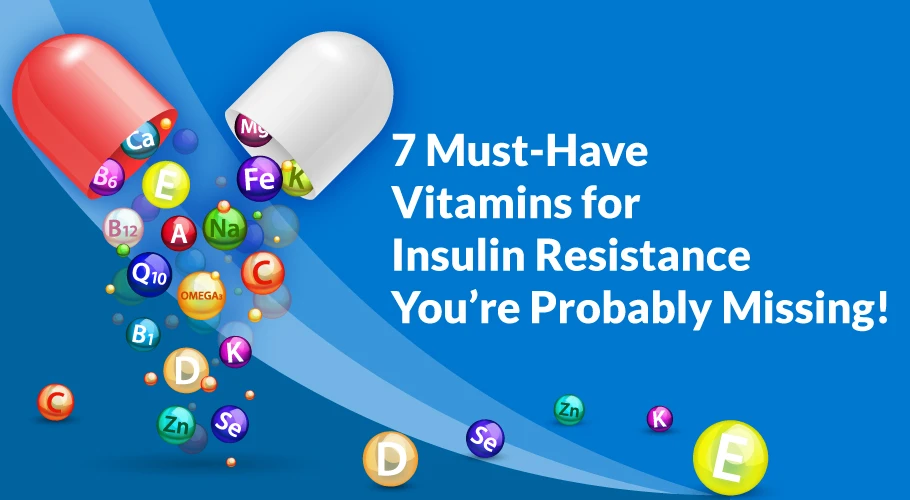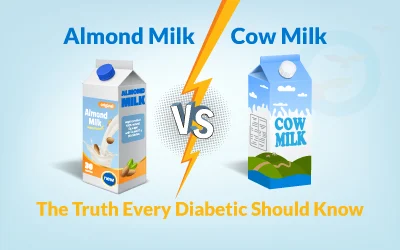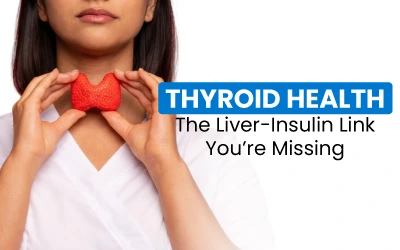7 Must-Have Vitamins for Insulin Resistance You’re Probably Missing!

Managing blood sugar isn’t only about cutting carbs and exercising, it's also about making sure your body gets the right nutrients. Certain vitamins can improve how your body responds to insulin, reduce inflammation, and support overall metabolic health. If you’re dealing with insulin resistance, type 2 diabetes, or prediabetes, these vitamins for insulin resistance may help you get back on track.
Why Vitamins Matter in Diabetes Management
Vitamins are essential for hormone balance, nerve function, immunity, and energy production. Research shows that deficiencies in specific vitamins can worsen insulin resistance and inflammation, making blood sugar harder to control. The good news? Focusing on the right vitamins can enhance your body’s ability to regulate glucose effectively.
7 Best Vitamins for Insulin Resistance & Blood Sugar Control
- Vitamin D - The Sunshine Vitamin for Insulin Sensitivity
Low vitamin D levels are common in people with type 2 diabetes. Research shows vitamin D plays a role in insulin production and improves how cells respond to insulin. Sunlight exposure, fortified dairy alternatives, and foods like mushrooms and fatty fish can help, but supplements may be needed if you’re deficient.
2. Vitamin B12 – Nerve Protection & Energy Support
People with type 2 diabetes, especially those on metformin, are at a higher risk of B12 deficiency. Low B12 can lead to fatigue, nerve problems, and poor glucose control. Including eggs, dairy, and fortified plant-based milk can help, or consider a supplement under medical supervision.
3. Vitamin A – Antioxidant Powerhouse
Low vitamin D levels are common in people with type 2 diabetes. Research shows vitamin D plays a role in insulin production and improves how cells respond to insulin. Sunlight exposure, fortified dairy alternatives, and foods like mushrooms and fatty fish can help, but supplements may be needed if you’re deficient.
4. Biotin – The Blood Sugar Balancer
Also known as Vitamin B7, biotin for blood sugar control has been studied for its role in improving glucose metabolism. Biotin may help enzymes involved in glucose breakdown work more effectively, reducing insulin resistance over time. Found in nuts, seeds, eggs, and whole grains.
5. Vitamin C – Immunity & Inflammation Support
Vitamin C helps reduce oxidative stress, which contributes to insulin resistance. It may also lower fasting blood sugar and improve HbA1c. Citrus fruits, bell peppers, and amla are excellent sources.
6. Vitamin E – Protecting Cells from Damage
Vitamin E is a fat-soluble antioxidant that protects cells from free radical damage, a process that worsens insulin resistance. Nuts, seeds, and vegetable oils are good sources. Some studies suggest Vitamin E may also help improve glucose control in people with type 2 diabetes.
7. Magnesium – The Multi-Benefit Mineral
While not a vitamin, magnesium is critical for insulin sensitivity. Low magnesium levels are linked to poor blood sugar control and increased risk of type 2 diabetes. Leafy greens, legumes, and nuts are rich in magnesium.
(Related read: Magnesium-Rich Foods for Indian Diet)
How to Include These Vitamins in Your Diet
Whole foods should be your first choice for vitamin intake. A diet rich in vegetables, fruits, nuts, seeds, and lean proteins ensures you get these nutrients naturally. If you have deficiencies, consult your doctor for safe supplementation.
Final Thoughts
Vitamins aren’t a cure for diabetes, but they are a powerful support tool. By focusing on the best vitamins for insulin resistance Vitamin D, B12, A, Biotin, C, E, and Magnesium you can improve blood sugar control, reduce complications, and enhance your overall health. Pair a nutrient-rich diet with regular exercise, stress management, and professional guidance for the best results.
FAQs
-
Which vitamin is best for diabetes?
Vitamin D and Magnesium are among the most beneficial, as they improve insulin sensitivity and glucose control. -
What is the relationship between vitamins and diabetes?
Certain vitamins help reduce inflammation, improve insulin response, and protect against complications like nerve damage. -
What vitamins are good for type 2 diabetes?
Vitamins D, B12, A, C, E, and minerals like magnesium are highly supportive for type 2 diabetes management. -
What vitamins lower your blood sugar?
Biotin, Vitamin D, and Magnesium have shown potential in helping lower blood sugar naturally. -
Can vitamins help with diabetes?
Yes, they can support better blood sugar control and reduce risks of complications when combined with a healthy lifestyle. -
Which supplement is best for diabetics?
Magnesium and Vitamin D supplements are often recommended for diabetics with deficiencies, but always consult a doctor first. -
Which vitamin is good for diabetes?
All seven mentioned D, B12, A, Biotin, C, E, and Magnesium play a vital role in diabetes care.
For more information about our reversal programs, visit www.freedomfromdiabetes.org

